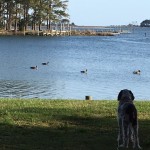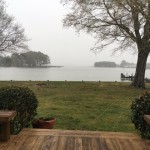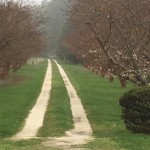The words of the famous Nora Ephron– her mother’s, in fact, also a screenwriter. Their family saying: Everything is fair game for telling a story, better, a good story. The best, the worst, the most illuminating, the most humiliating– and the latter makes better copy– goes into the pot.
Most importantly perhaps for the Ephrons, you must be the heroine (or hero) of your life, not the victim. Comedy helps to this end, a lot. As Ephron described it, if you slip on a banana peel, people laugh at you. If you tell people you slipped on a banana peel, you control the narrative and what they are laughing at, and you can laugh with them.
Ephron’s son, the journalist Jacob Bernstein, has made a documentary about his late mother that premiered on HBO Thursday night. But I was driving up the east coast that day, from the Eastern Shore to the Hudson Valley by way of Annapolis, and so caught only his interview about it on Fresh Air with Terry Gross— of course, yep, on the radio.
Ephron was so good at using comedy to get to the heart of stuff and did not hesitate to turn her writerly magnifying glass on anyone, herself included. As a writer, I have often lacked the hard-assed balls– sorry to mix anatomical metaphors– to go full out and risk hurting people. As Bernstein says, his mother seemed to be made of sterner, other, less ambivalent stuff than the rest of us. This is something I personally as a writer really need to keep working on. Not to set out to intentionally hurt anyone, but to be more honest without such accompanying compunction.
I’ve been keeping an ear out for Bernstein– I actually did not know about this film he was making– since I saw him on Morning Joe a few years back, speaking eloquently about his mother and her death. I felt this sorrowful connection, you see, as Ephron died, in June 2012, of the same kind of hideous leukemia that took my mother’s life in October 2011.
When I heard the news of Ephron’s death I had just traveled to Annapolis for my mother’s half-inurnment– half of her ashes went to the U. S. Naval Academy Columbarium, overlooking Dorsey Creek and surely one of the most lovely spots in the world to rest, and where my father, class of ’48, will go, and half to her beloved Halifax; so poetically appropriate that she would divide herself thus. That June, I went south from Annapolis to visit my college roommate, and it was there one lovely early summer evening in Virginia Beach I heard the news of Ephron’s death, so unexpected, and the cause, startling to me, acute myeloid leukemia, a disease I’d only learned of with my mother’s diagnosis ten months earlier.
A little uncanny then that I was traveling up the Eastern Shore on my way to Annapolis for the first time since that June, when I heard the Bernstein interview on Fresh Air.
I had fairly literally propelled myself southward, in the face of exhaustion both physical and emotional, to this peninsula that draws me continually back, the tail of a seahorse that is the DelMarVa. In this case to a little town as the crow flies about 60 miles northeast across the Bay of my alma mater and about the same distance southeast from where my first two Spinoni were born.
Once you cross into Delaware, the land flattens out, and it all seems greener even in winter; the trees get taller toward the Chesapeake. You sense the presence of a lot of water though you can’t see it yet. It makes me think of the Netherlands, water all around and underneath, everywhere water lapping at the edges.
In an essay I wrote about my mother in the year after her death, I described her as a little like the Nora Ephron of Halifax, that combination of brilliance and wicked sense of humor. One of my sisters cringed, saying it was going too far and that Mum would have cringed as well out of humility. But I stand by it.
As a writer Ephron remained on my periphery for a long time, but once she entered my radar I became a fast fan of her honesty, always hilarious though brutal at times– Bernstein aptly describes comedy as a fine line between bravery and ruthlessness, this is especially true of his mother– as well as her inclusion of cooking and recipes in her fiction, and her ability of course to laugh at herself: controlling the narrative.
When I got my ten-year passport renewal photo and saw, for the first time, the beginning of chicken cordon neck, my first thought was of Ephron’s essay about her own, and I felt less bereft. I loved her ruminations about enjoying food without all the American-style (my adjective) hangups, seeming to give everyone permission, herself included, to eat what they liked, and enjoy, dammit. Though little did we know, she wrote this knowing her days, and her enjoyment of food, were very likely severely numbered.
So into Annapolis this past week with a few of Nora Ephron’s words in my mind, and his son’s tribute to her. The literal touchstone of granite at the Columbarium, as I communed with my mother. How I wish she were here, to shed her wit on this crazy political cycle, to talk cooking, to tell me what she thinks of people I am wondering about– she had the most acute sense of the fabric of someone with only the briefest meeting or even a verbal description. To hold my hand as I walk through this fire of loss, and of love. Though something I read after her death does feel true, that she is more completely present to me in death than she ever could be in life.
Meanwhile for comic relief right then and there I had Clarence, three melatonin, two valium in and still going strong– he stood most of the way of the nine-plus hour drive, 13 to 301 to 50 to 95 to the TSP, I don’t think he slept at all. Sedated as he was I thought it was safe to take him out of the car with Nocci at the Columbarium for a leg stretch. I think we may have been headed back over the Bay Bridge before I was able to rein him in.
This trip was an investment in sanity, to hit reset and re-center. A change of scene, a change of pace, going on three years vacationless was a few years too many and I could not sustain the pace. Work can be, has been a refuge but a chronic lack of rest took its toll. Easter Monday 2012 is the last time I saw my son under normal– what I thought were normal– circumstances, when I took him to the airport to fly back to Chicago; I can still see him leaning to the window to say good bye again at the curb. I felt I could not take one more cycle of a holiday in the house where we’d celebrated a few, and though too exhausted to pick up and go away, I had to go away.
Driving back it struck me how many bridges I crossed– so many rivers, and the Bay, I lost count but there must have been at least a dozen. Looking at a map of this area you wonder how the land holds together at the edges, there are so many creeks and rivers and inlets and the bay and the ocean.
I am ok with bridges but the Bay Bridge to Annapolis always freaks me: so high, and you can feel it, and for some reason it seems less substantial than others, with a more direct view down. It did not help that there was a crosswind warning at the entrance, with one lane closed as a result.
It is one of the snapshots, visual as well as affective, that will remain with me from this week, along with ones like my birddogs conversing with passing geese on the Chesapeake,  the thick fog that rolled in on Easter,
the thick fog that rolled in on Easter, suiting my mood perfectly, the crunch of the oyster shell driveway, typical of the region and so familiar from my earliest days, visiting Williamsburg as a child.
suiting my mood perfectly, the crunch of the oyster shell driveway, typical of the region and so familiar from my earliest days, visiting Williamsburg as a child.  And most of all the feeling of being surrounded by water, and the sanctuary of it.
And most of all the feeling of being surrounded by water, and the sanctuary of it. Traveling over the Bay Bridge, tight grip on the wheel, trying not to look through those spindly seeming rails to the water far far below, felt like a coda for the whole of my existence at present. Hang on, it’s stronger than it looks, and you are stronger than you feel right now. We’ll get to the other side. Just don’t forget, all the way, you are the heroine, not the victim, of your story. Grab the damn narrative and don’t let go, xo
Traveling over the Bay Bridge, tight grip on the wheel, trying not to look through those spindly seeming rails to the water far far below, felt like a coda for the whole of my existence at present. Hang on, it’s stronger than it looks, and you are stronger than you feel right now. We’ll get to the other side. Just don’t forget, all the way, you are the heroine, not the victim, of your story. Grab the damn narrative and don’t let go, xo